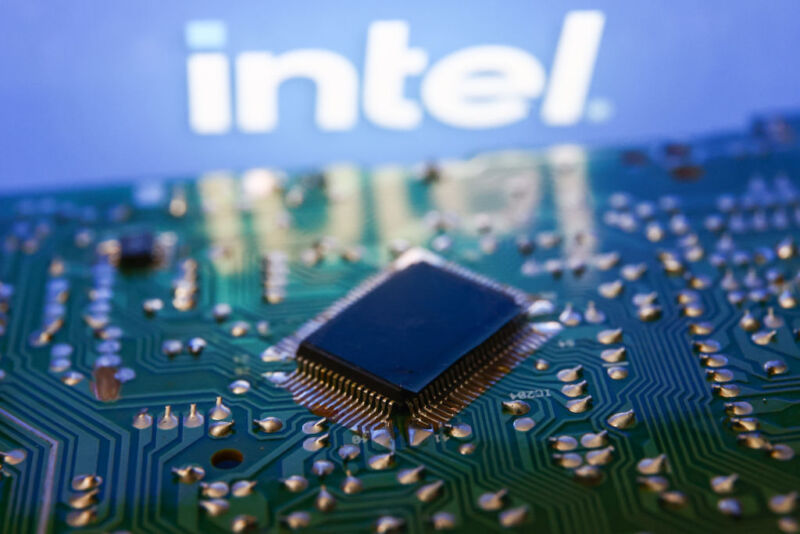

China blocks Intel’s $5.4B merger with Tower Semiconductor
source link: https://arstechnica.com/tech-policy/2023/08/china-blocks-intels-5-4b-merger-with-tower-semiconductor/
Go to the source link to view the article. You can view the picture content, updated content and better typesetting reading experience. If the link is broken, please click the button below to view the snapshot at that time.

Chips are down —
China blocks Intel’s $5.4B merger with Tower Semiconductor
Deal ends with Intel paying a $353 million termination fee to Tower.
Ashley Belanger - 8/16/2023, 3:56 PM

Today, Intel officially announced the termination of a $5.4 billion deal with Tower Semiconductor that was supposed to propel Intel closer to its "goal of becoming the second-largest global external foundry by the end of the decade."
Yesterday, the deadline for completing the deal passed after the tech companies failed to secure timely regulatory approval in China, Intel said in its press release.
Intel and Tower reached the deal in February 2022. According to Bloomberg, this week's scrapping of the deal was expected, as Chinese officials dragged their feet for months, ultimately never signing off on it.
The deal appears to have been terminated amicably, with Intel paying a $353 million termination fee to Tower.
"Our respect for Tower has only grown through this process, and we will continue to look for opportunities to work together in the future," Pat Gelsinger, Intel's CEO, said in the press release.
For Intel, this setback has ended a plan to expand its business into a "faster-growing part of the semiconductor industry" by tapping into Tower's expertise in making older chips still used in markets like electric vehicles, Bloomberg reported. By merging, Intel would have acquired Tower plants and customers, which could have given Intel more of an edge in varied markets against the dominant Taiwan Semiconductor Manufacturing Co. (TSMC).
Reducing dependency on TSMC as a chip supplier has become a priority for governments globally attempting to ramp up domestic chip supplies. Last year, TSMC chair Mark Liu warned that brewing tensions could cause China to invade Taiwan and render the most-advanced chip factory in the world “not operable,” CNBC reported.
AdvertisementThe US passed the CHIPS and Science Act and has been attempting to work with TSMC to open chip plants in Arizona, but these efforts have been delayed due to what TSMC claims is a lack of qualified workers in the US. As TSMC's fabs in the US continue to experience delays, other chipmakers securing funding from the CHIPS and Science Act, like Intel, become more critical to the US as it seeks to stabilize and ultimately dominate the chip industry.
When the CHIPS and Science Act passed, Intel's Gelsinger was "thrilled," he said in a statement.
"Intel is committed to restoring end-to-end leadership, innovation, and manufacturing here in the US," Gelsinger said.
But Bloomberg reported that when the CHIPS and Science Act passed, it put Intel in an "awkward" position. At the time, Intel was seeking to cut costs and slow down hiring after a grim earnings call. Gelsinger said back then that part of Intel's strategy to recover the company’s profitability was to expand into new chip markets, which the deal with Tower could have easily ensured.
Now Intel's Tower merger dreams have been dashed as US-China tensions rise. Last month, The Guardian reported that the economic "war" over chip technology has "become a major source of hostility between the world’s two superpowers." This tension is increasingly motivating China to block semiconductor deals that would benefit the US, Bloomberg reported, and is making it harder for companies like Intel to secure regulatory approval in China.
Stuart Pann, senior vice president and general manager of Intel Foundry Services, said in the press release that Intel will continue working toward its ambitious growth goals.
“Since its launch in 2021, Intel Foundry Services has gained traction with customers and partners, and we have made significant advancements toward our goal of becoming the second-largest global external foundry by the end of the decade," Pann said. "We are building a differentiated customer value proposition as the world’s first open system foundry, with the technology portfolio and manufacturing expertise that includes packaging, chiplet standards, and software, going beyond traditional wafer manufacturing.”
Recommend
About Joyk
Aggregate valuable and interesting links.
Joyk means Joy of geeK